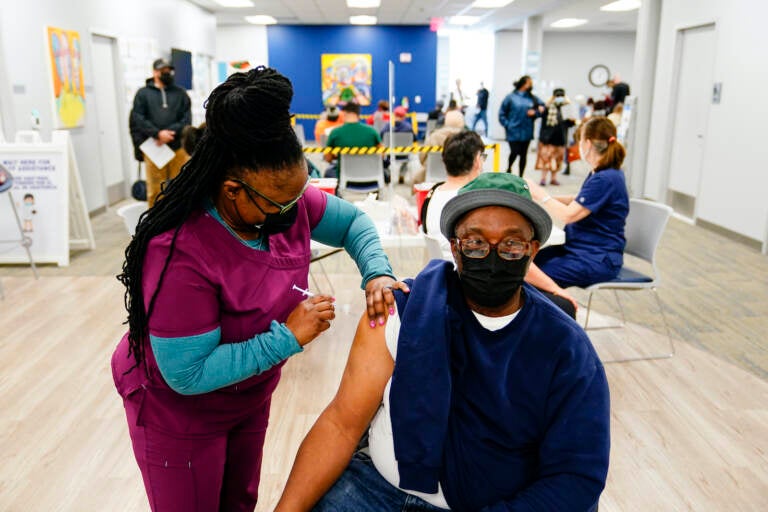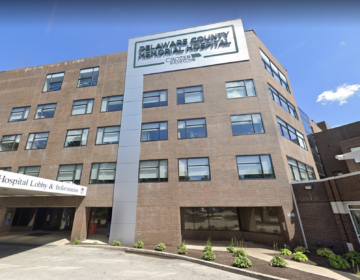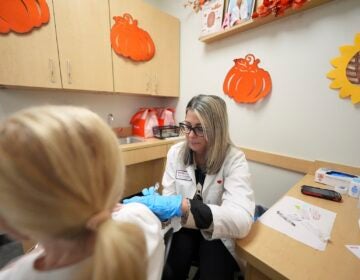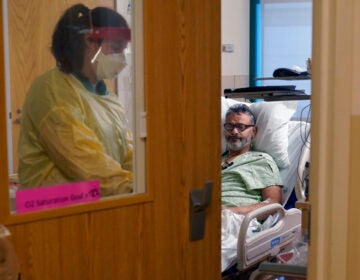Pennsylvania seeks more hospital beds, staff in COVID surge
Pennsylvania has begun to organize “strike teams” of extra workers for hospitals and nursing homes struggling with surging COVID-19-related caseloads and staffing shortages.

Nurse Sheena Davis administers a dose of a Moderna COVID-19 vaccine during a vaccination clinic at the Keystone First Wellness Center in Chester, Pa., Wednesday, Dec. 15, 2021. (AP Photo/Matt Rourke)
Pennsylvania has begun working to boost the number of hospital beds and organize “strike teams” of extra health care workers for hospitals and nursing homes struggling with surging COVID-19-related caseloads and staffing shortages, Gov. Tom Wolf’s office said Friday.
The Pennsylvania Department of Health and the Pennsylvania Emergency Management Agency are coordinating the undertaking after getting requests for help, Wolf’s office said.
The plans involve adding hospital beds within regions for 60 days to absorb patients from swamped hospitals. Additional medical support staff are to include physicians, respiratory therapists, and registered nurses, Wolf’s office said.
Other staff will be sent directly to hospitals in need over the next three months. Certain nursing homes also will get additional beds, registered nurses, and aides to allow hospitals in the area to more quickly discharge patients in need of long-term rehab or care.
In an interview Friday, Acting Secretary of Health Keara Klinepeter said the administration is working as quickly as possible to bring help and to bring as much as it can. The number of new beds will depend on the number of health care staff it can procure, Klinepeter said.
Klinepeter expects the plan to be in full operation by early February — when she expects rising hospitalizations to peak — although certain aspects could take effect before then, she said.
The department is in discussions with a staffing firm to bring health professionals from another state, but does not have a contract finalized, Klinepeter said.
Right now, the department is most concerned about the northeast and southcentral regions of Pennsylvania, Klinepeter said. The destination for the additional medical staff and beds will be guided by the latest available data when they arrive, she said.
In the meantime, Wolf and Klinepeter have urged people to get vaccinated and get a booster shot.
“Given the state that the hospitals are in right now, every Pennsylvanian plays a part in helping our heroic frontline health care workers, and that means people need to get vaccinated if they haven’t already,” Klinepeter said.
Klinepeter said people should wear masks in public, get tested if they don’t feel good, and stay home if they test positive. Those who are having trouble getting access to a test should stay home and assume that they are COVID-19-positive, she said.
The administration’s search for help comes after three federal “strike teams” composed of military service members went to Scranton Regional Hospital and WellSpan York in recent days to open 30 hospital beds for a month, although that could be extended.
Dr. Tony Aquilina, the chief physician executive at WellSpan Health, which operates the York hospital, said 40% of the system’s 1,200 are there because of COVID-19.
“To have 40% of your hospitalizations due to COVID-19 is an enormous, enormous burden,” Aquilina said in a virtual news conference Thursday.
Hospitals and nursing homes statewide have been sounding the alarm in recent weeks as largely unvaccinated COVID-19 patients fill hospital beds.
That has sent some acute-care facilities over capacity, jammed some emergency rooms, and forced nursing homes to stop accepting new residents.
Pennsylvania is reporting an average of more than 21,000 new, confirmed infections per day over the past week, up four times since the last week of November.
The number of COVID-19-positive patients in the hospital has doubled since mid-November, now at an average of more than 5,300 per day for the past two weeks and rising quickly.
The one-day total of COVID-19-positive patients in Pennsylvania’s hospitals — more than 6,600, according to state data — is higher than at any other time during the pandemic, the Hospital and Healthsystem Association of Pennsylvania said.
“This surge comes during the most severe health care staffing shortage in recent memory,” the association’s president and CEO Andy Carter said in a statement.
In addition to the staffing shortage, the association attributed the strain to rising COVID-19 cases, the flu and other seasonal illnesses, and an influx of patients requiring more intensive care due to care being delayed earlier in the pandemic.
As of Monday, just over one-third of Pennsylvania’s hospitals were at 90% capacity or higher for staffed inpatient beds, and almost one in 10 were at 100% capacity or higher, the association said.

Get daily updates from WHYY News!
WHYY is your source for fact-based, in-depth journalism and information. As a nonprofit organization, we rely on financial support from readers like you. Please give today.




![CoronavirusPandemic_1024x512[1]](https://whyy.org/wp-content/uploads/2020/03/CoronavirusPandemic_1024x5121-300x150.jpg)


